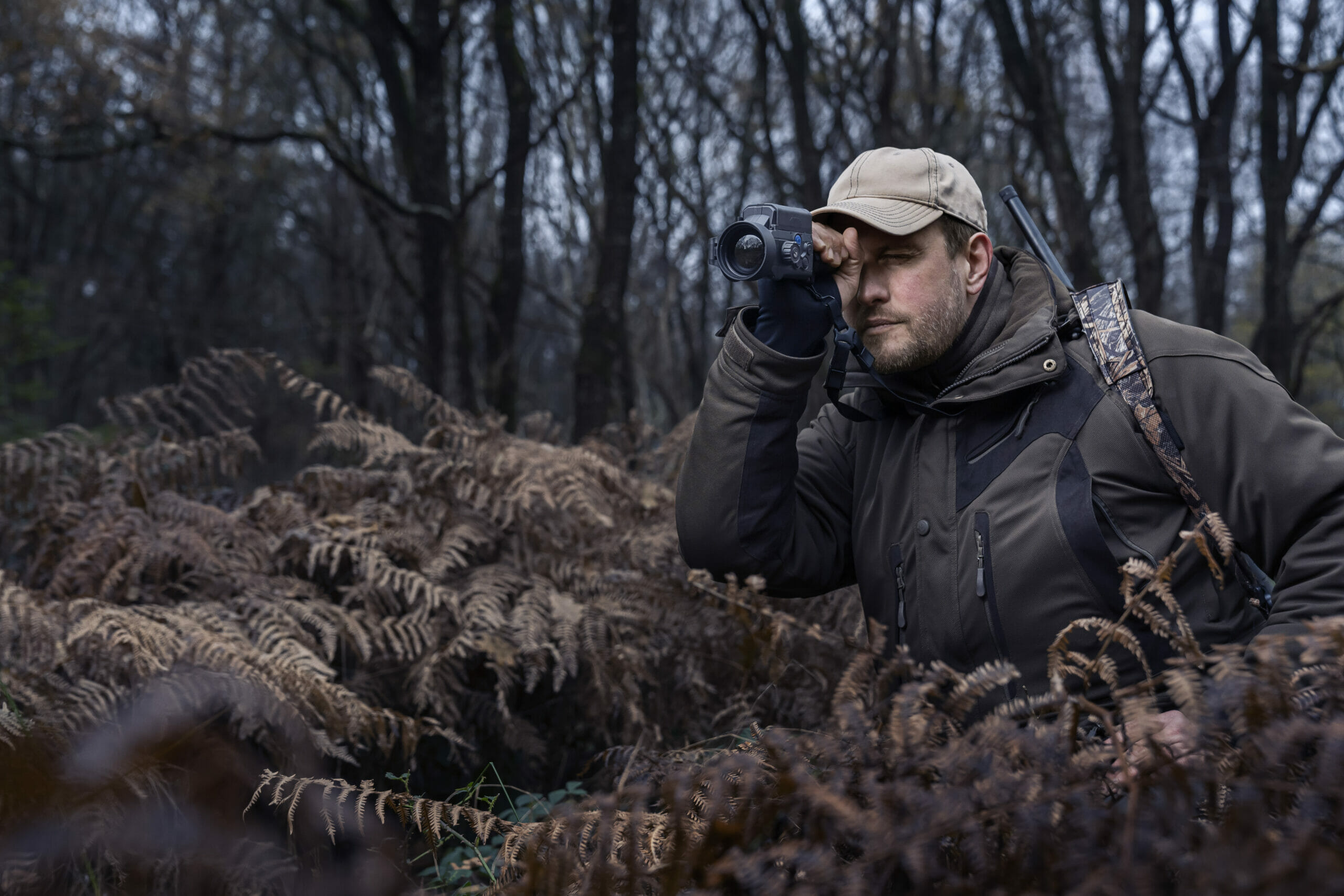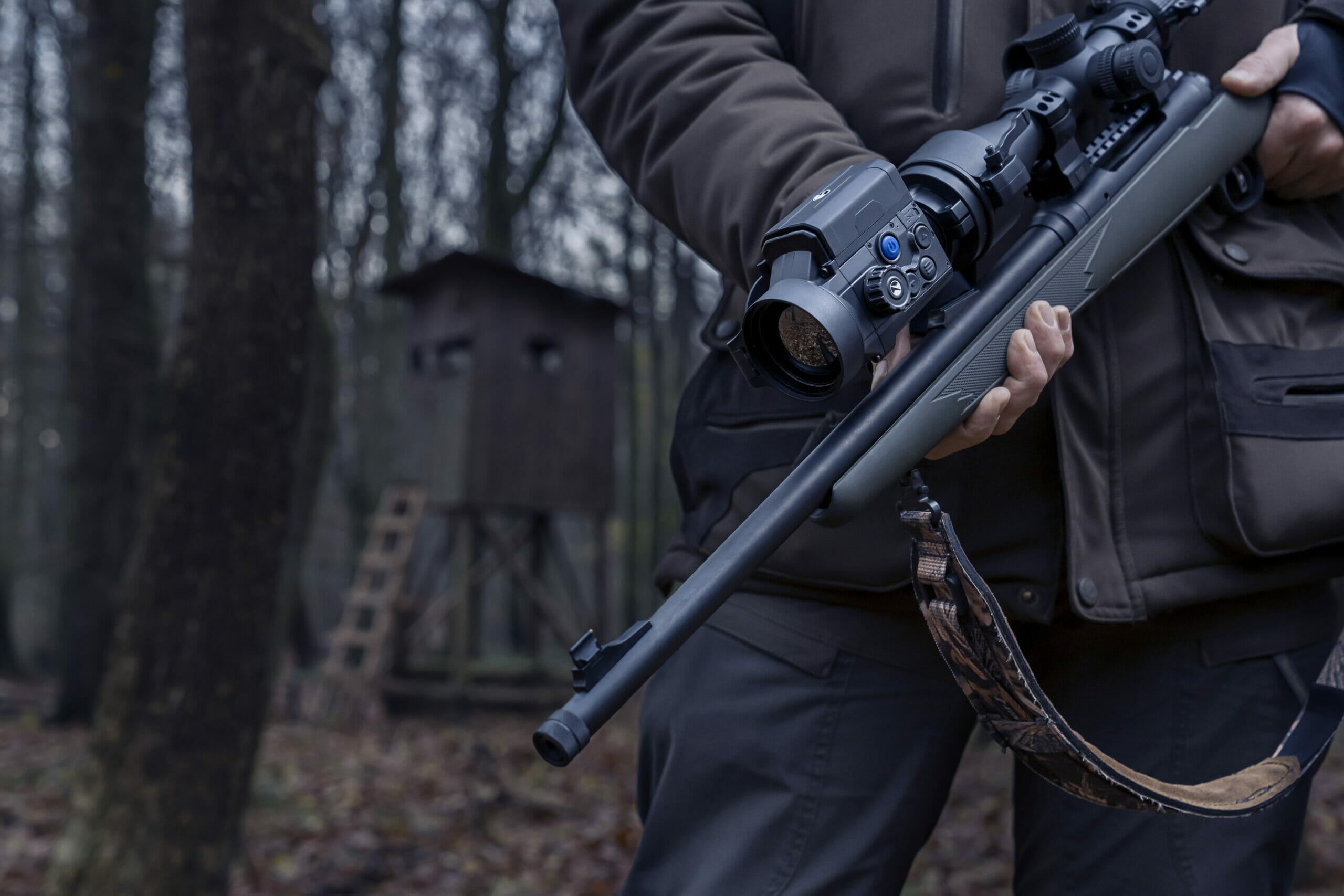Henrik Sproedt is a hunter and innovations expert from Germany. Now, he’s also the main character of the Pulsar Krypton 2 FXG50 thermal imaging attachment video. Here, he starred with his son, Justus, as hunting takes a special part of their relationship. Today, we invite you to learn more about the bond between Henrik and Justus, Henrik’s journey towards holistic hunting, and enjoy some behind-the-scenes shots from the video shoot in Germany.
Henrik is a wonderful, multifaceted person to get to know. If you look at his professional CV, he is an experienced communications designer, a sought-after consultant with management experience, and an expert in user-led innovation with a PhD in innovation research, among many things.
Henrik’s own introduction of himself is much more humble: “I’m Henrik, I’m German, and I’m 49 years old. I have two children, live in the Northern part of Germany, and I’m a passionate hunter.”
“It all started in 2005 when my daughter was born. I was living in Hamburg together with my wife, and I was working as a consultant. The problem was that I never saw my newborn daughter awake because my working days were long, and I made the decision to quit. My wife and I, we moved up here, and we bought a house. So, what brought us here was basically the wish to have more time with the family.”
He tells us when asked about his journey to Northern Germany and closer to nature. It’s not exactly an uncommon story, though – more and more people are leaving urbanized environments for a slower, calmer pace of life, and yet, few of them turn into passionate hunters. But for Henrik, this seemed like a natural step forward.
But then he is also a family man who works hard on fostering a deep, meaningful relationship with his children – and a bond with nature that few of us still have: “Hunting with my son, or with my daughter… I mean, it’s all about the moment. And the moment when you’re out there, when you share this moment with someone you love – that is unbeatable”.
“Hunting is not about killing predominantly, at least in my eyes”, Henrik stresses.“ Most people who don’t hunt think that we go out, kill an animal, and go home. But hunting is about being in nature, being a part of nature, and being aware that you are a part of it. It depends on respect.“
When I was young, the whole outdoors was our play yard. We lived in a suburb-like village at that time.
The first computer C64 and computer games came out when I was about nine years old. In short, I knew how to start a campfire and fish before I even knew anything about pixels and bytes. The logical consequence for me was to get my hunting license as soon as I was old enough and had the time and money.
Also, during my time at school and university, I was never extremely interested in urban environments. I mean, of course, I enjoyed pubs, cinemas, museums and such, but at every possible time, I took off either to the beach for surfing or to be in nature for fishing and, later, hunting.
For me, that was more real, and it inspired my creativity, which helped me as a communication designer. The change between urban and rural life kept me aware of what is special in each environment.
“My advice to myself would be to trust your passion more rather than following what the majority of people are doing and make sure you are as independent as possible. Never trust public transport (smiles). And remember, no track is more beaten than the one everyone has to take to get from A to B. Rather take a walk off-road.”
That literal off-road, which allows being in nature, Henrik admits, allows him to stay grounded, modest and humble. Like many hunters, he also tells us that realizing oneself as a part of nature brings awareness of your own efforts and (in)significance.
“It’s not rocket science to feel, read, and experience nature. It’s just being out there. Be aware, take your time, and open your eyes”, adds Henrik when I wonder if this deep connection is something that requires lots of effort. Now, I’m curious to learn how this translates into his hunting philosophy.
The freedom to be outdoors, get your own food and learn and live with nature. The responsibility – always to respect nature and especially every creature, shoot safely, and be aware of the larger consequences of your actions.
Hunting is neither a religion nor a science. It is just demanding in terms of balancing joy, knowledge and responsibility. Yes, we take an animal’s life. It is a natural action which allows us to enjoy delicious food. It makes us aware of the circle of life. It is not fancy, cool or thrilling. It is just something that is part of life.
“My son and me, we go hunting very often together. He has followed me hunting since he was four years old, and he got his hunting license this year. I try to pass all that on to him and basically let him go through an apprenticeship.”
The circumstances and values behind and related to this vary from community to community and from country to country depending on different values and cultures, but safety, joy and responsibility combined with deep roots and love for nature is something we all share.
Having developed such a holistic approach to hunting himself, Henrik now passes it on to his son Justus, who seems to be very happy to join his father in numerous outdoor activities.
You need to know your craft, and knowing your craft, in this particular case means, that you know enough about the animals that you hunt so that you’re able to identify them.
The other part is that you know your tools. You need to know your ballistics, you need to know safety rules. You need to be able to shoot.
You don’t shoot anything unless you’re absolutely sure it’s the right animal you’ll hit and that it is of the right age. You need to be absolutely certain that you can place the shot well. It’s not about the second or the third follow-up shot; it’s about one shot. One shot, one kill, that’s the intention.
The most important aspects for me are ease of use, ergonomics, battery life (if electric) and reliability and ruggedness. I do not want to bother with finicky specialties.”
“For me, it matters a lot where a device comes from. How is the service? Does the manufacturer take me seriously, and do they also help me after I have paid my money? How does the manufacturer deal with problems? Do they openly communicate about them and fix the issues, or do they try to get away with any screw-ups?”
Curiously, it was through room for improvement that Henrik came about to be a Pulsar ambassador. Years ago, he sent us an email with some detailed feedback on a device he’d purchased. We invited him to discuss the improvements further, and soon enough, they came to life.
So, the feeling is mutual – we, too, believe that manufacturers are responsible for their products well beyond the purchase, and we work hard to stand behind our words. And these values, together with love, respect and responsibility for nature, are some of the most important things we share with Henrik – and many hunters around the world.
“You need to know your craft. You need to be absolutely certain that you can place the shot well. It’s not about the second or the third follow-up shot; it’s about one shot.”
Before purchasing any night or thermal vision device, please make sure you adhere to the local legislation and only use it when it is allowed. Our ambassadors come from various countries and travel a lot, which allows them to test different devices. We do not encourage or support the illegal use of our devices in any events. If you wish to learn more about export and sales restriction policy, please visit the following link: Export and Sales Restriction Policy.



